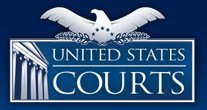Administrative Office of the U.S. Courts : http://www.uscourts.gov/

Current Federal Rules of Practice & Procedure
- The Federal Rules of Criminal Procedure govern criminal proceedings and prosecutions in the U.S. district courts, the courts of appeals, and the Supreme Court. Their purpose is to "provide for the just determination of every criminal proceeding, to secure simplicity in procedure and fairness in administration, and to eliminate unjustifiable expense and delay." Fed. R. Crim. P. 2. The original rules were adopted by order of the Supreme Court on December 26, 1944, transmitted to Congress on January 3, 1945, and effective March 21, 1946. The rules have since been amended numerous times, most recently in 2014.
- The Federal Rules of Evidence govern the admission or exclusion of evidence in most proceedings in the United States courts. The Supreme Court submitted proposed Federal Rules of Evidence to Congress on February 5, 1973, but Congress exercised its power under the Rules Enabling Act to suspend their implementation. The Federal Rules of Evidence became federal law on January 2, 1975, when President Ford signed the Act to Establish Rules of Evidence for Certain Courts and Proceedings, Pub. L. No. 93-595. As enacted, the Evidence Rules included amendments by Congress to the rules originally proposed by the Supreme Court. The most recent amendments to the Federal Rules of Evidence were adopted in 2014.
Rules Governing Section 2254 and Section 2255 Proceedings
- Generally, the Rules Governing Section 2254 Cases in the United States District Courts govern habeas corpus petitions filed in a United States district court pursuant to 28 U.S.C. § 2254 by a person in custody challenging his or her current or future custody under a state-court judgment on the grounds that such custody violates the Constitution or laws or treaties of the United States. The Rules Governing Section 2255 Proceedings for the United States District Courts govern motions to vacate, set aside or correct a sentence filed pursuant to 28 U.S.C. § 2255. Such motions must be filed in the sentencing court by a person in custody attacking the sentence imposed on the ground that the sentence was imposed in violation of the Constitution or laws of the United States, that the court was without jurisdiction to impose such sentence, or that the sentence was in excess of the maximum authorized by law, or is otherwise subject to collateral attack.
- The Supreme Court submitted proposed rules and forms governing proceedings under Section 2254 and Section 2255 to Congress on April 26, 1976, but Congress exercised its power under the Rules Enabling Act to suspend their implementation. The Rules Governing Section 2254 and Section 2255 Proceedings, as amended by Congress, became federal law on September 28, 1976, and made applicable to petitions filed under Section 2254 and motions filed under section 2255 on or after February 1, 1977. Pub. L. No. 94-426. The rules were last amended in 2009.
Amendments Approved by the Rules Committees – Pending Judicial Conference or Supreme Court Review
- There are no rules amendments currently under review. Amendments will appear here when they occur.
)